Introduction to Business Law and Ethics: Contract Law Analysis
VerifiedAdded on 2021/06/17
|6
|1635
|40
Homework Assignment
AI Summary
This document analyzes four key issues related to contract law. The first question examines whether a contract between siblings is enforceable, considering the intention to create legal relations. The second question discusses the application of promissory estoppel in a scenario where a promise was made and relied upon. The third issue focuses on the validity of a restraint of trade clause in an employment contract, assessing its reasonableness and protection of business interests. The final question addresses whether past consideration can support a valid contract, examining the legal liability for a promised reward. The document provides legal analysis, applying relevant case law and principles to each scenario to determine the outcomes.
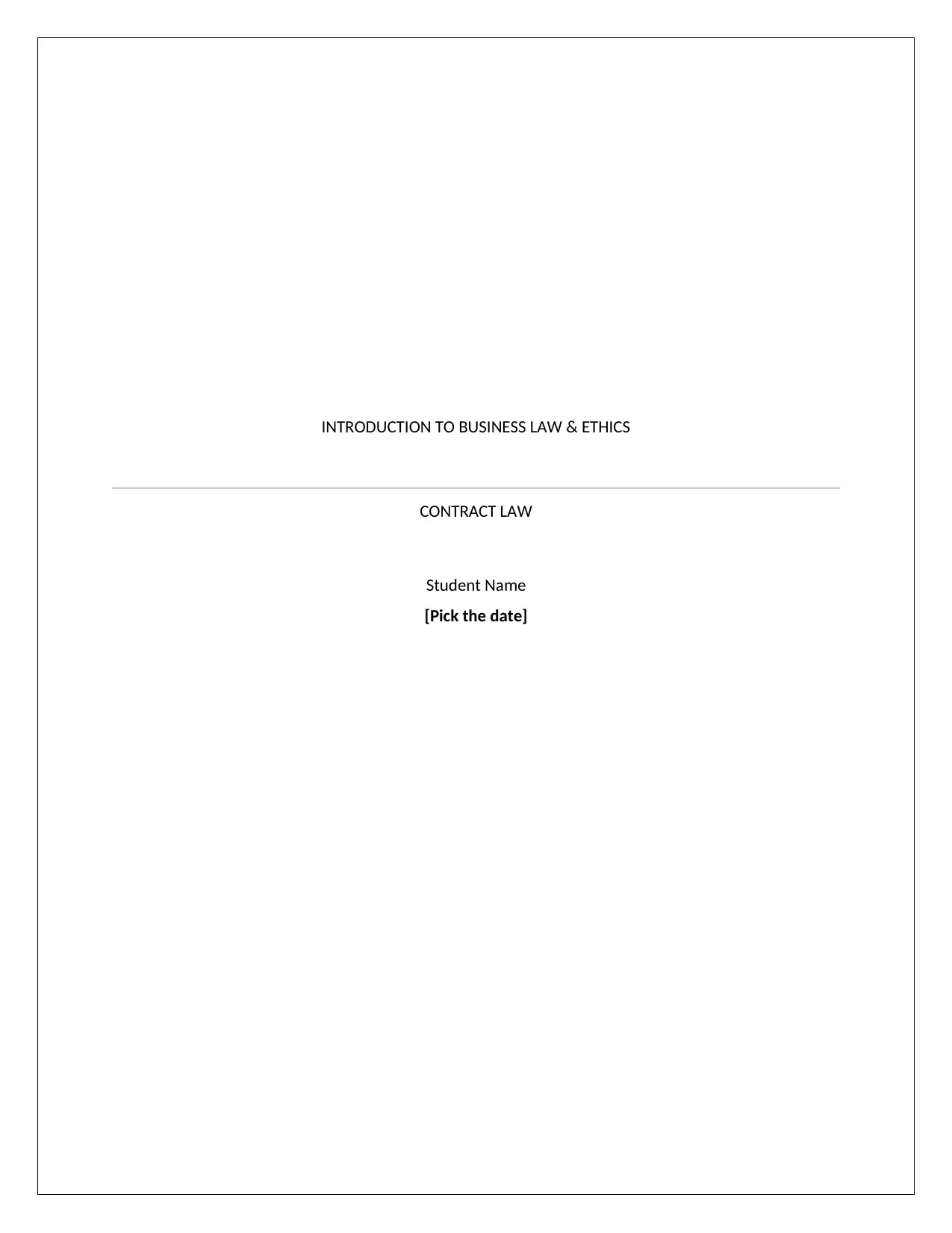
INTRODUCTION TO BUSINESS LAW & ETHICS
CONTRACT LAW
Student Name
[Pick the date]
CONTRACT LAW
Student Name
[Pick the date]
Paraphrase This Document
Need a fresh take? Get an instant paraphrase of this document with our AI Paraphraser
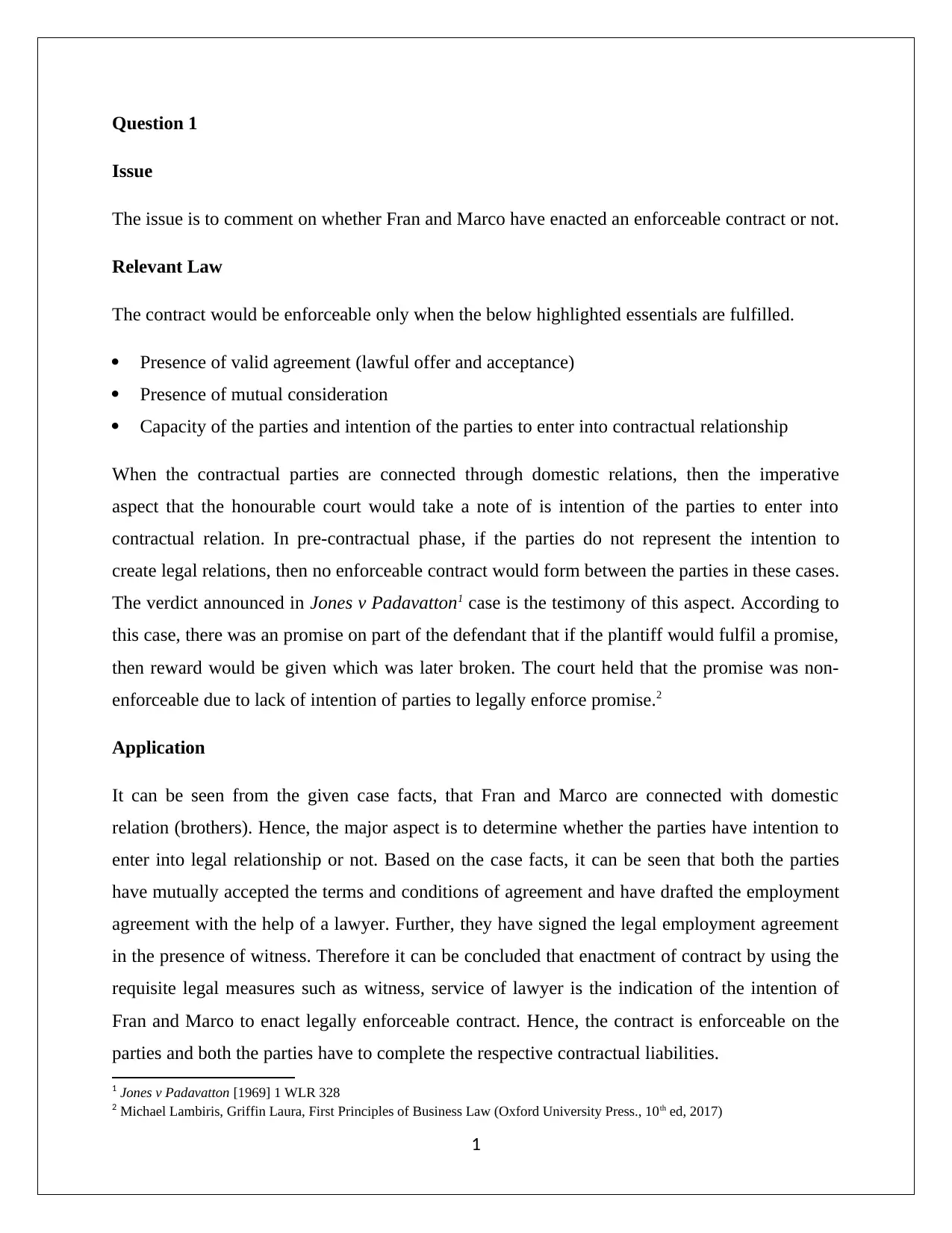
Question 1
Issue
The issue is to comment on whether Fran and Marco have enacted an enforceable contract or not.
Relevant Law
The contract would be enforceable only when the below highlighted essentials are fulfilled.
Presence of valid agreement (lawful offer and acceptance)
Presence of mutual consideration
Capacity of the parties and intention of the parties to enter into contractual relationship
When the contractual parties are connected through domestic relations, then the imperative
aspect that the honourable court would take a note of is intention of the parties to enter into
contractual relation. In pre-contractual phase, if the parties do not represent the intention to
create legal relations, then no enforceable contract would form between the parties in these cases.
The verdict announced in Jones v Padavatton1 case is the testimony of this aspect. According to
this case, there was an promise on part of the defendant that if the plantiff would fulfil a promise,
then reward would be given which was later broken. The court held that the promise was non-
enforceable due to lack of intention of parties to legally enforce promise.2
Application
It can be seen from the given case facts, that Fran and Marco are connected with domestic
relation (brothers). Hence, the major aspect is to determine whether the parties have intention to
enter into legal relationship or not. Based on the case facts, it can be seen that both the parties
have mutually accepted the terms and conditions of agreement and have drafted the employment
agreement with the help of a lawyer. Further, they have signed the legal employment agreement
in the presence of witness. Therefore it can be concluded that enactment of contract by using the
requisite legal measures such as witness, service of lawyer is the indication of the intention of
Fran and Marco to enact legally enforceable contract. Hence, the contract is enforceable on the
parties and both the parties have to complete the respective contractual liabilities.
1 Jones v Padavatton [1969] 1 WLR 328
2 Michael Lambiris, Griffin Laura, First Principles of Business Law (Oxford University Press., 10th ed, 2017)
1
Issue
The issue is to comment on whether Fran and Marco have enacted an enforceable contract or not.
Relevant Law
The contract would be enforceable only when the below highlighted essentials are fulfilled.
Presence of valid agreement (lawful offer and acceptance)
Presence of mutual consideration
Capacity of the parties and intention of the parties to enter into contractual relationship
When the contractual parties are connected through domestic relations, then the imperative
aspect that the honourable court would take a note of is intention of the parties to enter into
contractual relation. In pre-contractual phase, if the parties do not represent the intention to
create legal relations, then no enforceable contract would form between the parties in these cases.
The verdict announced in Jones v Padavatton1 case is the testimony of this aspect. According to
this case, there was an promise on part of the defendant that if the plantiff would fulfil a promise,
then reward would be given which was later broken. The court held that the promise was non-
enforceable due to lack of intention of parties to legally enforce promise.2
Application
It can be seen from the given case facts, that Fran and Marco are connected with domestic
relation (brothers). Hence, the major aspect is to determine whether the parties have intention to
enter into legal relationship or not. Based on the case facts, it can be seen that both the parties
have mutually accepted the terms and conditions of agreement and have drafted the employment
agreement with the help of a lawyer. Further, they have signed the legal employment agreement
in the presence of witness. Therefore it can be concluded that enactment of contract by using the
requisite legal measures such as witness, service of lawyer is the indication of the intention of
Fran and Marco to enact legally enforceable contract. Hence, the contract is enforceable on the
parties and both the parties have to complete the respective contractual liabilities.
1 Jones v Padavatton [1969] 1 WLR 328
2 Michael Lambiris, Griffin Laura, First Principles of Business Law (Oxford University Press., 10th ed, 2017)
1
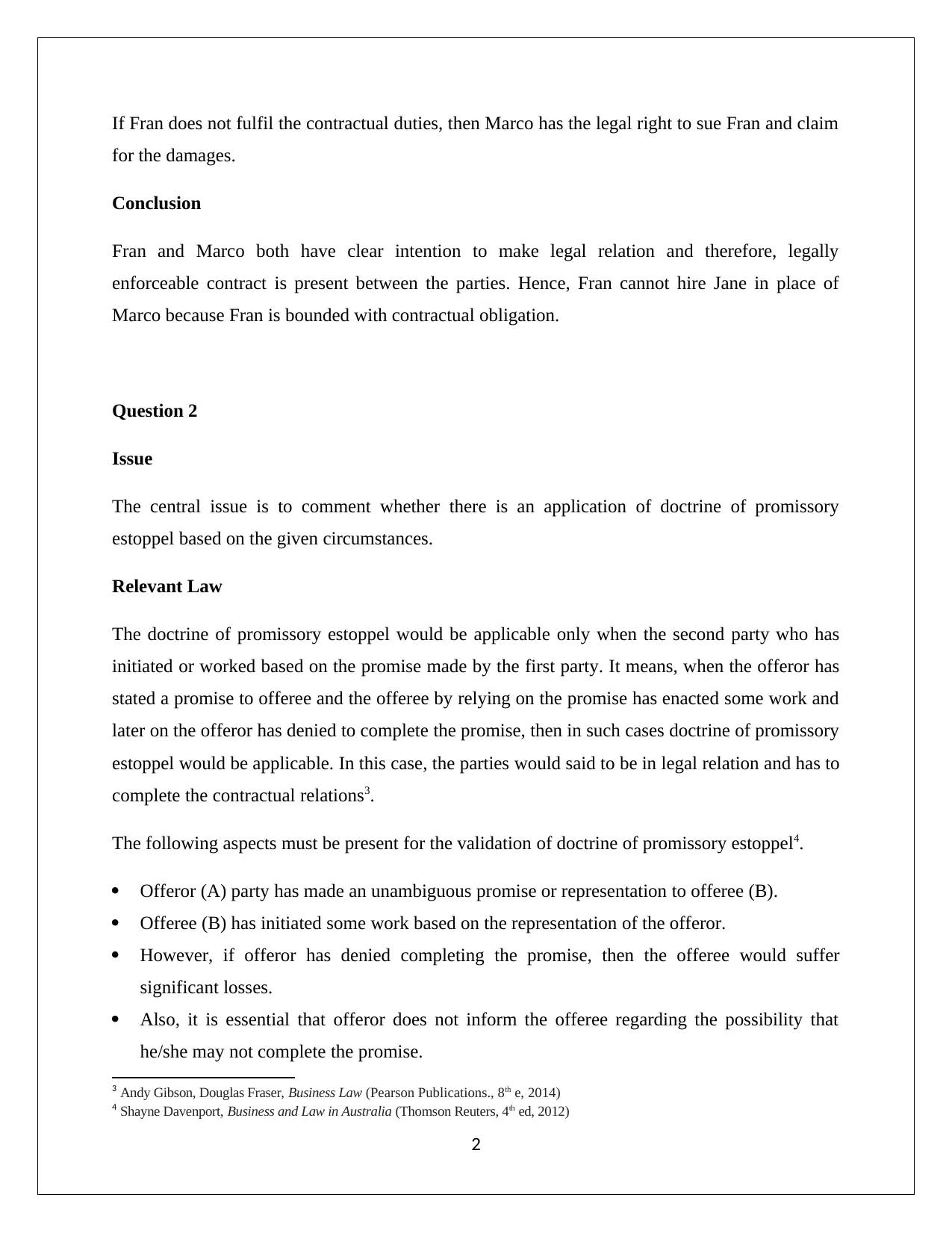
If Fran does not fulfil the contractual duties, then Marco has the legal right to sue Fran and claim
for the damages.
Conclusion
Fran and Marco both have clear intention to make legal relation and therefore, legally
enforceable contract is present between the parties. Hence, Fran cannot hire Jane in place of
Marco because Fran is bounded with contractual obligation.
Question 2
Issue
The central issue is to comment whether there is an application of doctrine of promissory
estoppel based on the given circumstances.
Relevant Law
The doctrine of promissory estoppel would be applicable only when the second party who has
initiated or worked based on the promise made by the first party. It means, when the offeror has
stated a promise to offeree and the offeree by relying on the promise has enacted some work and
later on the offeror has denied to complete the promise, then in such cases doctrine of promissory
estoppel would be applicable. In this case, the parties would said to be in legal relation and has to
complete the contractual relations3.
The following aspects must be present for the validation of doctrine of promissory estoppel4.
Offeror (A) party has made an unambiguous promise or representation to offeree (B).
Offeree (B) has initiated some work based on the representation of the offeror.
However, if offeror has denied completing the promise, then the offeree would suffer
significant losses.
Also, it is essential that offeror does not inform the offeree regarding the possibility that
he/she may not complete the promise.
3 Andy Gibson, Douglas Fraser, Business Law (Pearson Publications., 8th e, 2014)
4 Shayne Davenport, Business and Law in Australia (Thomson Reuters, 4th ed, 2012)
2
for the damages.
Conclusion
Fran and Marco both have clear intention to make legal relation and therefore, legally
enforceable contract is present between the parties. Hence, Fran cannot hire Jane in place of
Marco because Fran is bounded with contractual obligation.
Question 2
Issue
The central issue is to comment whether there is an application of doctrine of promissory
estoppel based on the given circumstances.
Relevant Law
The doctrine of promissory estoppel would be applicable only when the second party who has
initiated or worked based on the promise made by the first party. It means, when the offeror has
stated a promise to offeree and the offeree by relying on the promise has enacted some work and
later on the offeror has denied to complete the promise, then in such cases doctrine of promissory
estoppel would be applicable. In this case, the parties would said to be in legal relation and has to
complete the contractual relations3.
The following aspects must be present for the validation of doctrine of promissory estoppel4.
Offeror (A) party has made an unambiguous promise or representation to offeree (B).
Offeree (B) has initiated some work based on the representation of the offeror.
However, if offeror has denied completing the promise, then the offeree would suffer
significant losses.
Also, it is essential that offeror does not inform the offeree regarding the possibility that
he/she may not complete the promise.
3 Andy Gibson, Douglas Fraser, Business Law (Pearson Publications., 8th e, 2014)
4 Shayne Davenport, Business and Law in Australia (Thomson Reuters, 4th ed, 2012)
2
⊘ This is a preview!⊘
Do you want full access?
Subscribe today to unlock all pages.

Trusted by 1+ million students worldwide
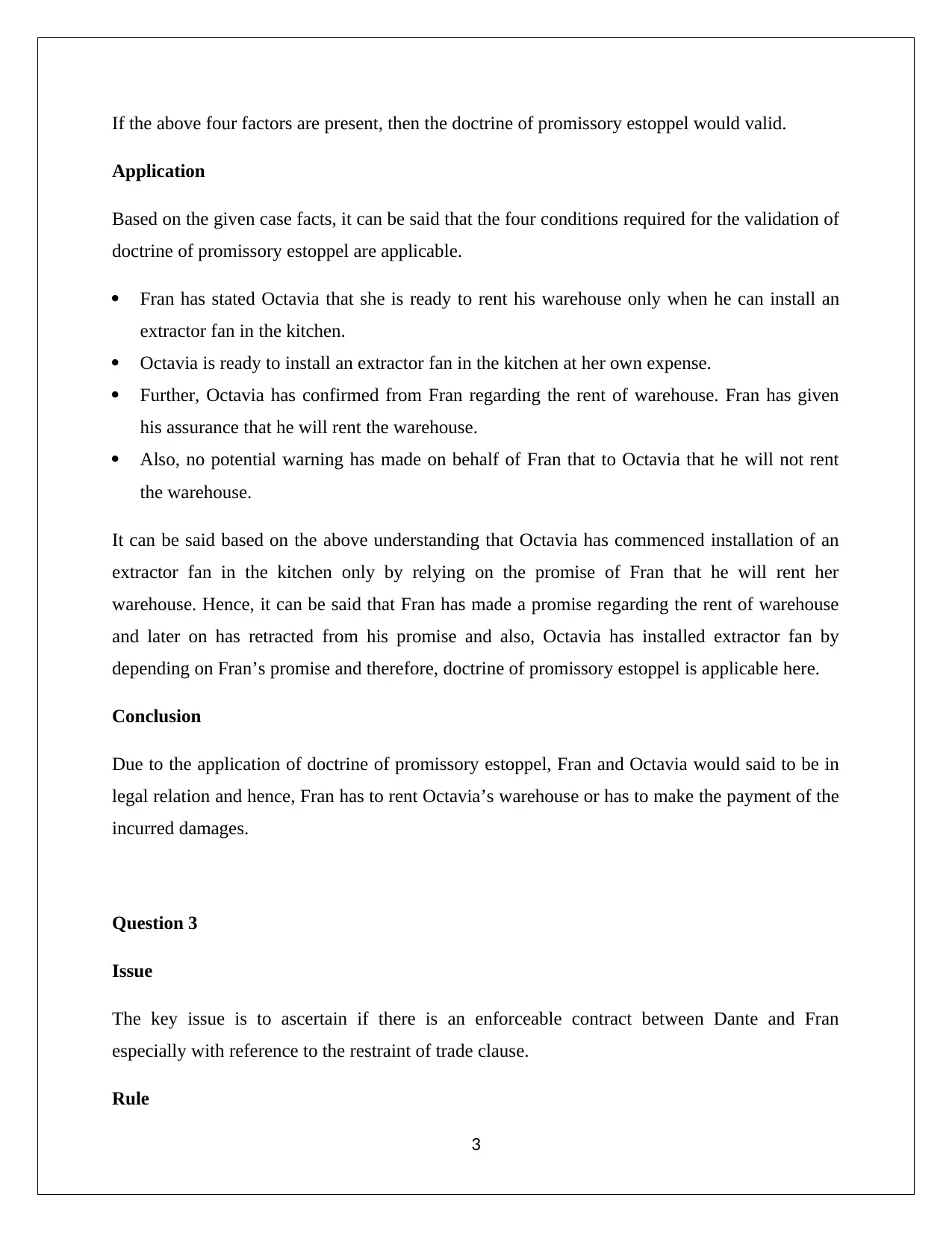
If the above four factors are present, then the doctrine of promissory estoppel would valid.
Application
Based on the given case facts, it can be said that the four conditions required for the validation of
doctrine of promissory estoppel are applicable.
Fran has stated Octavia that she is ready to rent his warehouse only when he can install an
extractor fan in the kitchen.
Octavia is ready to install an extractor fan in the kitchen at her own expense.
Further, Octavia has confirmed from Fran regarding the rent of warehouse. Fran has given
his assurance that he will rent the warehouse.
Also, no potential warning has made on behalf of Fran that to Octavia that he will not rent
the warehouse.
It can be said based on the above understanding that Octavia has commenced installation of an
extractor fan in the kitchen only by relying on the promise of Fran that he will rent her
warehouse. Hence, it can be said that Fran has made a promise regarding the rent of warehouse
and later on has retracted from his promise and also, Octavia has installed extractor fan by
depending on Fran’s promise and therefore, doctrine of promissory estoppel is applicable here.
Conclusion
Due to the application of doctrine of promissory estoppel, Fran and Octavia would said to be in
legal relation and hence, Fran has to rent Octavia’s warehouse or has to make the payment of the
incurred damages.
Question 3
Issue
The key issue is to ascertain if there is an enforceable contract between Dante and Fran
especially with reference to the restraint of trade clause.
Rule
3
Application
Based on the given case facts, it can be said that the four conditions required for the validation of
doctrine of promissory estoppel are applicable.
Fran has stated Octavia that she is ready to rent his warehouse only when he can install an
extractor fan in the kitchen.
Octavia is ready to install an extractor fan in the kitchen at her own expense.
Further, Octavia has confirmed from Fran regarding the rent of warehouse. Fran has given
his assurance that he will rent the warehouse.
Also, no potential warning has made on behalf of Fran that to Octavia that he will not rent
the warehouse.
It can be said based on the above understanding that Octavia has commenced installation of an
extractor fan in the kitchen only by relying on the promise of Fran that he will rent her
warehouse. Hence, it can be said that Fran has made a promise regarding the rent of warehouse
and later on has retracted from his promise and also, Octavia has installed extractor fan by
depending on Fran’s promise and therefore, doctrine of promissory estoppel is applicable here.
Conclusion
Due to the application of doctrine of promissory estoppel, Fran and Octavia would said to be in
legal relation and hence, Fran has to rent Octavia’s warehouse or has to make the payment of the
incurred damages.
Question 3
Issue
The key issue is to ascertain if there is an enforceable contract between Dante and Fran
especially with reference to the restraint of trade clause.
Rule
3
Paraphrase This Document
Need a fresh take? Get an instant paraphrase of this document with our AI Paraphraser
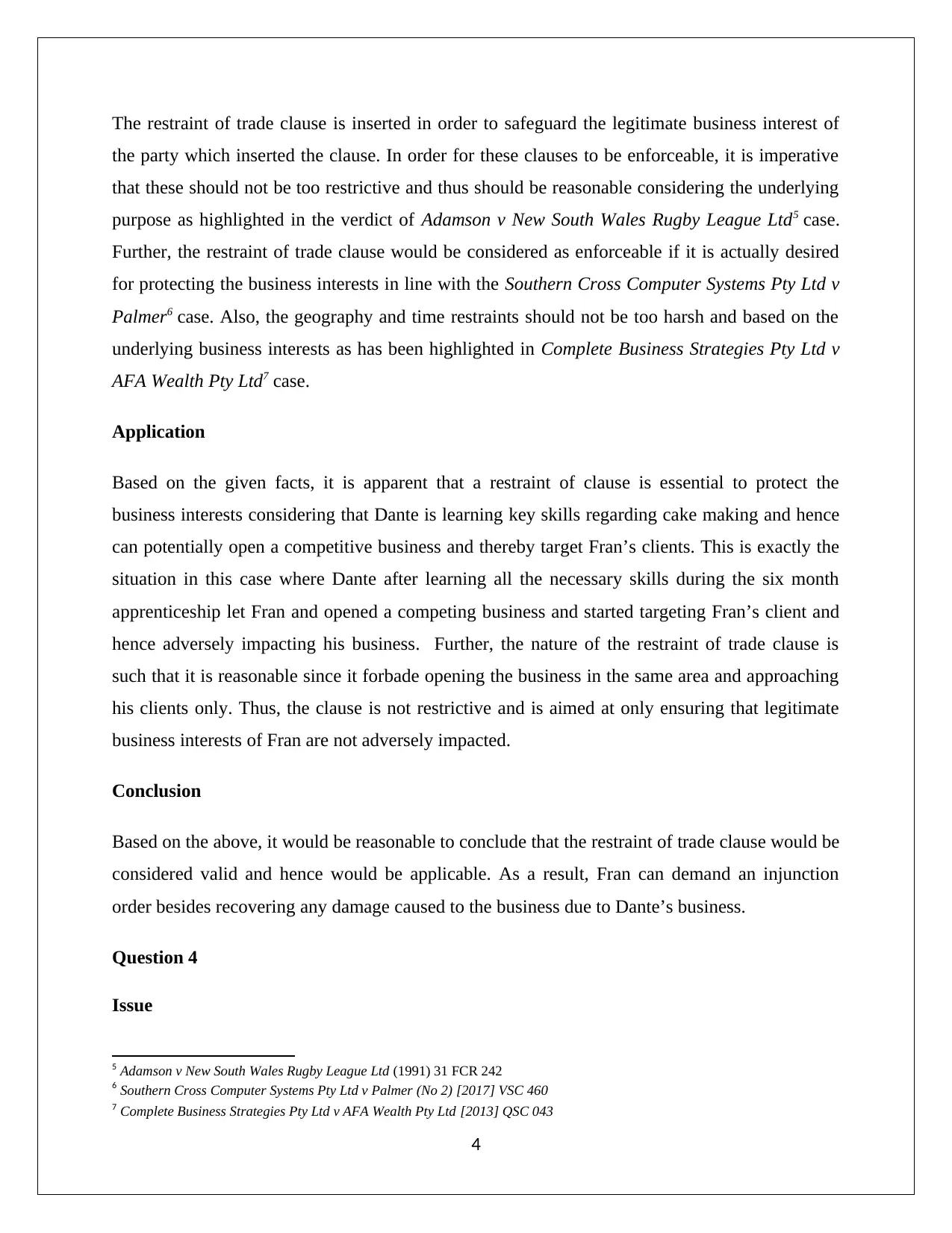
The restraint of trade clause is inserted in order to safeguard the legitimate business interest of
the party which inserted the clause. In order for these clauses to be enforceable, it is imperative
that these should not be too restrictive and thus should be reasonable considering the underlying
purpose as highlighted in the verdict of Adamson v New South Wales Rugby League Ltd5 case.
Further, the restraint of trade clause would be considered as enforceable if it is actually desired
for protecting the business interests in line with the Southern Cross Computer Systems Pty Ltd v
Palmer6 case. Also, the geography and time restraints should not be too harsh and based on the
underlying business interests as has been highlighted in Complete Business Strategies Pty Ltd v
AFA Wealth Pty Ltd7 case.
Application
Based on the given facts, it is apparent that a restraint of clause is essential to protect the
business interests considering that Dante is learning key skills regarding cake making and hence
can potentially open a competitive business and thereby target Fran’s clients. This is exactly the
situation in this case where Dante after learning all the necessary skills during the six month
apprenticeship let Fran and opened a competing business and started targeting Fran’s client and
hence adversely impacting his business. Further, the nature of the restraint of trade clause is
such that it is reasonable since it forbade opening the business in the same area and approaching
his clients only. Thus, the clause is not restrictive and is aimed at only ensuring that legitimate
business interests of Fran are not adversely impacted.
Conclusion
Based on the above, it would be reasonable to conclude that the restraint of trade clause would be
considered valid and hence would be applicable. As a result, Fran can demand an injunction
order besides recovering any damage caused to the business due to Dante’s business.
Question 4
Issue
5 Adamson v New South Wales Rugby League Ltd (1991) 31 FCR 242
6 Southern Cross Computer Systems Pty Ltd v Palmer (No 2) [2017] VSC 460
7 Complete Business Strategies Pty Ltd v AFA Wealth Pty Ltd [2013] QSC 043
4
the party which inserted the clause. In order for these clauses to be enforceable, it is imperative
that these should not be too restrictive and thus should be reasonable considering the underlying
purpose as highlighted in the verdict of Adamson v New South Wales Rugby League Ltd5 case.
Further, the restraint of trade clause would be considered as enforceable if it is actually desired
for protecting the business interests in line with the Southern Cross Computer Systems Pty Ltd v
Palmer6 case. Also, the geography and time restraints should not be too harsh and based on the
underlying business interests as has been highlighted in Complete Business Strategies Pty Ltd v
AFA Wealth Pty Ltd7 case.
Application
Based on the given facts, it is apparent that a restraint of clause is essential to protect the
business interests considering that Dante is learning key skills regarding cake making and hence
can potentially open a competitive business and thereby target Fran’s clients. This is exactly the
situation in this case where Dante after learning all the necessary skills during the six month
apprenticeship let Fran and opened a competing business and started targeting Fran’s client and
hence adversely impacting his business. Further, the nature of the restraint of trade clause is
such that it is reasonable since it forbade opening the business in the same area and approaching
his clients only. Thus, the clause is not restrictive and is aimed at only ensuring that legitimate
business interests of Fran are not adversely impacted.
Conclusion
Based on the above, it would be reasonable to conclude that the restraint of trade clause would be
considered valid and hence would be applicable. As a result, Fran can demand an injunction
order besides recovering any damage caused to the business due to Dante’s business.
Question 4
Issue
5 Adamson v New South Wales Rugby League Ltd (1991) 31 FCR 242
6 Southern Cross Computer Systems Pty Ltd v Palmer (No 2) [2017] VSC 460
7 Complete Business Strategies Pty Ltd v AFA Wealth Pty Ltd [2013] QSC 043
4
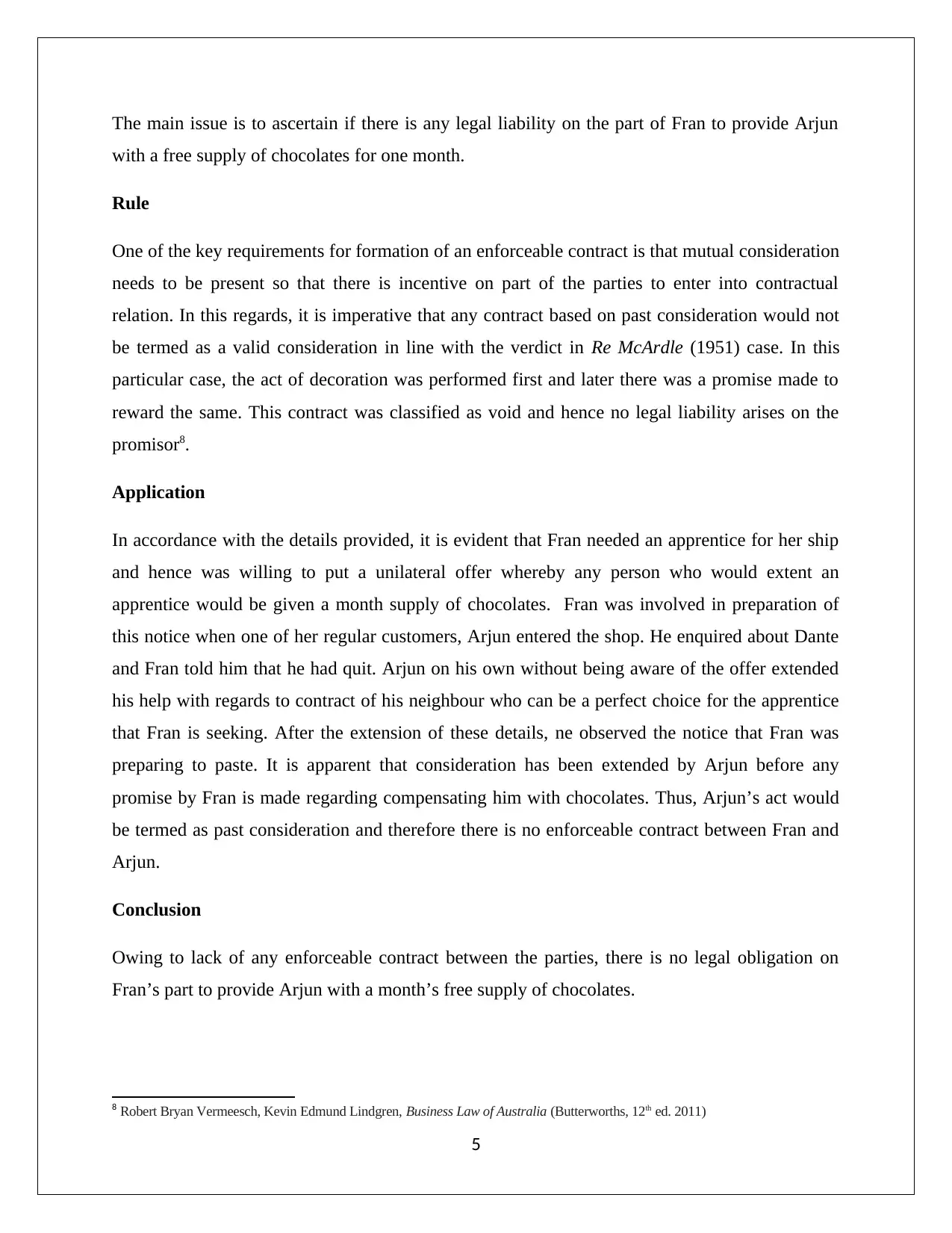
The main issue is to ascertain if there is any legal liability on the part of Fran to provide Arjun
with a free supply of chocolates for one month.
Rule
One of the key requirements for formation of an enforceable contract is that mutual consideration
needs to be present so that there is incentive on part of the parties to enter into contractual
relation. In this regards, it is imperative that any contract based on past consideration would not
be termed as a valid consideration in line with the verdict in Re McArdle (1951) case. In this
particular case, the act of decoration was performed first and later there was a promise made to
reward the same. This contract was classified as void and hence no legal liability arises on the
promisor8.
Application
In accordance with the details provided, it is evident that Fran needed an apprentice for her ship
and hence was willing to put a unilateral offer whereby any person who would extent an
apprentice would be given a month supply of chocolates. Fran was involved in preparation of
this notice when one of her regular customers, Arjun entered the shop. He enquired about Dante
and Fran told him that he had quit. Arjun on his own without being aware of the offer extended
his help with regards to contract of his neighbour who can be a perfect choice for the apprentice
that Fran is seeking. After the extension of these details, ne observed the notice that Fran was
preparing to paste. It is apparent that consideration has been extended by Arjun before any
promise by Fran is made regarding compensating him with chocolates. Thus, Arjun’s act would
be termed as past consideration and therefore there is no enforceable contract between Fran and
Arjun.
Conclusion
Owing to lack of any enforceable contract between the parties, there is no legal obligation on
Fran’s part to provide Arjun with a month’s free supply of chocolates.
8 Robert Bryan Vermeesch, Kevin Edmund Lindgren, Business Law of Australia (Butterworths, 12th ed. 2011)
5
with a free supply of chocolates for one month.
Rule
One of the key requirements for formation of an enforceable contract is that mutual consideration
needs to be present so that there is incentive on part of the parties to enter into contractual
relation. In this regards, it is imperative that any contract based on past consideration would not
be termed as a valid consideration in line with the verdict in Re McArdle (1951) case. In this
particular case, the act of decoration was performed first and later there was a promise made to
reward the same. This contract was classified as void and hence no legal liability arises on the
promisor8.
Application
In accordance with the details provided, it is evident that Fran needed an apprentice for her ship
and hence was willing to put a unilateral offer whereby any person who would extent an
apprentice would be given a month supply of chocolates. Fran was involved in preparation of
this notice when one of her regular customers, Arjun entered the shop. He enquired about Dante
and Fran told him that he had quit. Arjun on his own without being aware of the offer extended
his help with regards to contract of his neighbour who can be a perfect choice for the apprentice
that Fran is seeking. After the extension of these details, ne observed the notice that Fran was
preparing to paste. It is apparent that consideration has been extended by Arjun before any
promise by Fran is made regarding compensating him with chocolates. Thus, Arjun’s act would
be termed as past consideration and therefore there is no enforceable contract between Fran and
Arjun.
Conclusion
Owing to lack of any enforceable contract between the parties, there is no legal obligation on
Fran’s part to provide Arjun with a month’s free supply of chocolates.
8 Robert Bryan Vermeesch, Kevin Edmund Lindgren, Business Law of Australia (Butterworths, 12th ed. 2011)
5
⊘ This is a preview!⊘
Do you want full access?
Subscribe today to unlock all pages.

Trusted by 1+ million students worldwide
1 out of 6
Related Documents
Your All-in-One AI-Powered Toolkit for Academic Success.
+13062052269
info@desklib.com
Available 24*7 on WhatsApp / Email
![[object Object]](/_next/static/media/star-bottom.7253800d.svg)
Unlock your academic potential
Copyright © 2020–2026 A2Z Services. All Rights Reserved. Developed and managed by ZUCOL.


